Updated Oct. 22
2 Women File Suit Against Black News Channel
DeMaurice Smith Blasts Blacks Defending Gruden
Context Needed on Failure to Pass Voting Rights
Drive Aims to Provide Ethel Payne a Proper Grave
Short Takes: Melissa Harris-Perry; guilty plea to threatening journalist’s family; Lorraine Forte; Abdul-Hakim Shabazz; Terri Cope-Walton; Krissah Thompson; Betty Yu; Julio Ricardo Varela and Osita Nwanevu; diversity in San Diego-area newsrooms; Nikole Hannah-Jones; Univision and Entravision; Nic Garcia and Reporter’s Notebook; Native American group vs. Fox News; freed journalists in Myanmar; Colombia culpable in journalist’s abduction; search renewed for Journal-isms assistant editor.
Homepage photo: The NAACP’s flag flies on New York’s Fifth Avenue in 1936. (Credit: University of North Carolina)
[btnsx id=”5768″]
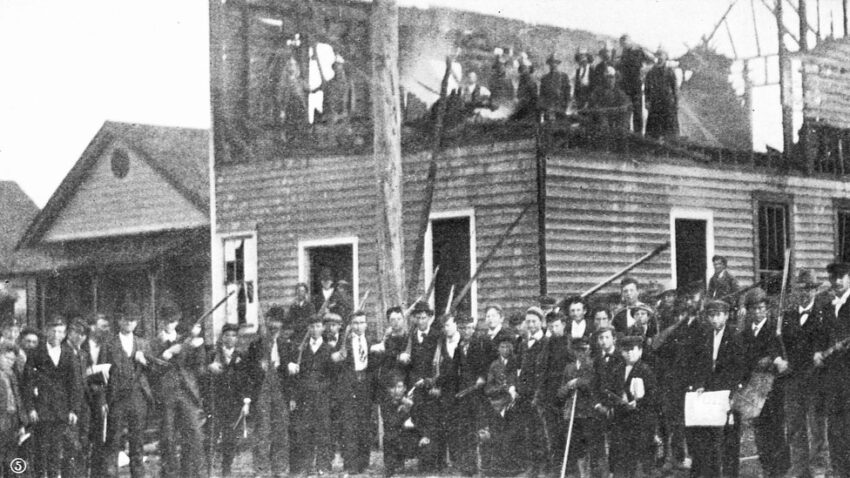
Students Document Press Complicity With Racism
“The University of Maryland’s Howard Center for Investigative Journalism on Monday began publishing its latest collaborative project, ‘Printing Hate,’ a thorough exploration of the racist pasts of newspapers,” the university announced on Monday.
The announcement comes on the eve of the release of a collaboration of academics, “Journalism and Jim Crow: White Supremacy and the Black Struggle for a New America.” Co-editors Kathy Roberts Forde and Sid Bedingfield conclude, “News leaders and journalists should make it a point to learn about the history of white supremacy in American journalism and discuss it in open forums as they do the important work of pulling it out by the roots.”
The university’s project also follows a study by the Craig Newmark Graduate School of Journalism at the City University of New York that praises Black media, declaring, “Black media center the humanity of people who are often dehumanized by society and not given that by mainstream media. Black media accurately call people killed by police brutality victims, sons and daughters.”
The Maryland announcement said, “From the end of Reconstruction to 1940, newspapers were the most powerful news medium in America. Those run by white supremacist publishers and editors printed headlines and stories that fueled racial hate, inciting massacres and lynchings of Black citizens.
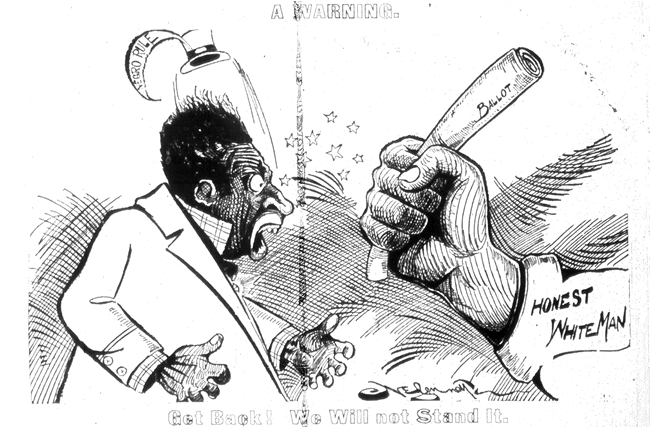
“The Howard Center will publish more than 30 stories on the subject after teaming journalism students from the University of Maryland’s Philip Merrill College of Journalism, Hampton University, Howard University, Morehouse College, Morgan State University, North Carolina Agricultural & Technical State University and the University of Arkansas.”
 It also said, “Inspired by Merrill Associate Professor and Washington Post writer DeNeen L. Brown’s (pictured) reporting on the 1921 Tulsa Race Massacre, the students spent the spring, summer and fall of 2021 digging into archives and interviewing descendants, experts and historians to document the power of white-owned newspapers to harm the Black community.”
It also said, “Inspired by Merrill Associate Professor and Washington Post writer DeNeen L. Brown’s (pictured) reporting on the 1921 Tulsa Race Massacre, the students spent the spring, summer and fall of 2021 digging into archives and interviewing descendants, experts and historians to document the power of white-owned newspapers to harm the Black community.”
Brown said in the release, “I hope the readers will be as courageous. No discomfort inflicted on the reader could be worse than the pain and trauma inflicted on Black Americans who suffered the terrorism of lynchings and massacres. By examining historic coverage of white-owned and Black-owned newspapers, perhaps ‘Printing Hate’ can serve as an impetus for current-day newsrooms and other media outlets to accurately tell what happened and what is currently happening in America.”
The announcement continued, “The students were guided by four visiting professionals — retired Washington Post editors Milton Coleman and Deborah Heard, former Los Angeles Times and St. Louis Post-Dispatch reporter Ron Harris, and Washington poet and lawyer CeLillianne Green — as well as faculty and staff from UMD and Arkansas.
“To supplement the writing, the students analyzed data, shot photos, recorded audio, created static and motion graphics, designed a website and built a news application that will allow people to explore historical lynching coverage by approximately 100 newspapers that still exist in some form today. . . .”
- Journal-isms: How Media Fanned the Nation’s Racism (Oct. 19, 2020)
- Journal-isms: Should Washington Post Join in Mea Culpas? (scroll way down) (Jan. 10)
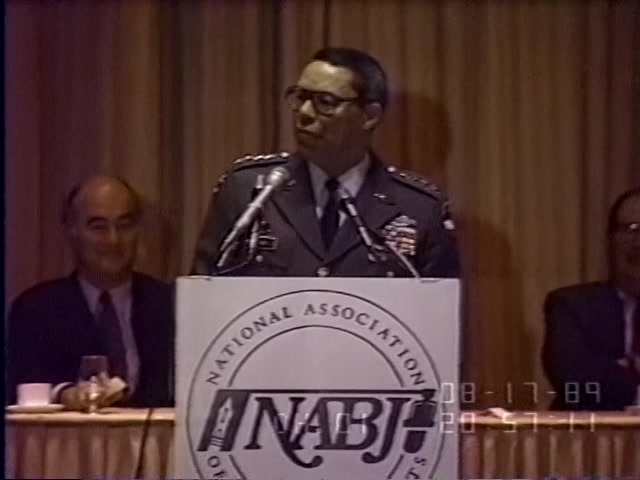
Powell Was Spark for Diversity at State Department
The death Monday of Colin Powell, the first Black secretary of state and the youngest chairman of the Joint Chiefs of Staff, has prompted a look back at his role in U.S. military adventures. Less mentioned was that Powell was also a spark for diversity.
Jon Allsop wrote Tuesday for Columbia Journalism Review, “Numerous journalists from outlets across the board attempted, with nuance, to weigh Powell’s war legacy against his achievements, including his status as the first Black person to serve as secretary of state. . . . Many other journalists and outlets, however, eschewed nuance in favor of hagiography, pushing Iraqi voices to the margins, at best, and centering themes of bipartisanship, patriotism, civility, and meritocracy that are catnip to the American media establishment. . . .”
Some dishonest media outlets used Powell’s passing at 84 due to complications from COVID-19 to falsely cast doubt on the efficacy of vaccines. While fully vaccinated, Powell had underlying health issues that compromised his immunity.
Those were the more common big-picture takes. But there was more.
“The agency began talking seriously about the need for a diplomatic service that truly represents the American people during Colin Powell’s tenure as secretary of state, and particularly after 9/11,” Nicholas Kralev wrote in 2016 for Foreign Policy.
“But in the years since, the argument for more diversity has grown beyond representation to include a national security dimension. The challenges to U.S. foreign policy, such as terrorism, human and drug trafficking, cyber crime, and public health crises can no longer be resolved by working only with other governments, dozens of diplomats told me.
“If they want to be truly influential in the age of globalization, instant communication, and social media, they added, they must engage much more directly with the citizens of their host countries than they have in the past. Such engagement with ‘real people’ abroad is more effective when done by ‘real’ Americans, rather than an out-of-touch elite, they said. . . .
“Every secretary of state since Powell has committed publicly to diversity. It has been a decade since a white man occupied the post of director-general of the Foreign Service, a position traditionally given to career diplomats, which doubles as director of human resources for the entire State Department, including the Civil Service and political appointees.
“One of those senior officers, Linda Thomas-Greenfield, is now assistant secretary of state for African affairs. At the midlevel, there are diplomats like Robyn McCutcheon, a transgender officer and former president of GLIFAA, the Foreign Service’s LGBT organization. Then there is Clayton Bond. Black and gay, he belongs to a very small minority, but his mere presence in the diplomatic ranks is a victory of sorts. Back when his now-spouse, Ted Osius, currently the ambassador to Vietnam, became a Foreign Service officer in 1989, those found out to be gay were often expelled from the service. . . .”
State Department figures as of June 30 [PDF] show that in the senior executive service, whose members serve in the key positions just below the top presidential appointees, 83.1 percent were white, 7.4 percent African American, 0.0 percent American Indian, 6.5 percent Asian, 0.4 percent Native Hawaiian, 1.3 percent multirace and 2.6 percent Hispanic.
Civil service employees were 61.6 percent white; 24.6 percent African American; 0.6 percent American Indian; 7.6 percent Asian; 0.3 percent Native Hawaiian; 2.6 percent multirace; 7.0 percent Hispanic.
- Associated Press: CNN’s John King says he has MS, grateful for vaccinations
- Michael Barbaro with Robert Draper, “The Daily,” New York Times: The Life and Career of Colin Powell (podcast)
- Joyce Ferriabough Bolling, Boston Herald: Anti-vax hecklers can’t harm Powell’s 4-star memory
- Bobbi Bowman, Facebook: How Colin Powell had my back at our Episcopal church
- Curtis Bunn, NBC News: Black military members on Colin Powell’s influence and importance
- Karen DeYoung and Missy Ryan, Washington Post: Iraq War role was a stain on Powell’s record — one he openly said he regretted
- Michael Fletcher, the Undefeated: Colin Powell broke many barriers in the military and in civic life with dignity, respect and honesty
- Robin Givhan, Washington Post: Remembering where Colin Powell came from
- Emil Guillermo, Asian American Legal Defense and Education Fund: On “Firsterism” and other lessons from Gen. Colin Powell
- Theodore R. Johnson, New York Times: The Paradox of Colin Powell
- Margaret Kimberley, Black Agenda Report: The Many Crimes of Colin Powell
- Colbert King, Washington Post: Colin Powell — moments to remember
- Peter Maass, the Intercept: Colin Powell Was a Nice Man Who Helped Destroy Iraq
- Amy Mackinnon, Foreign Policy: Colin Powell, ‘Reluctant Warrior’ Who Made the Case for the Iraq War, Dead at 84
- Lee Moran, HuffPost: Fox News Hosts Trashed For ‘Disgraceful’ Spin On Colin Powell’s Death
- Askia Muhammad, Washington Informer: Colin Powell, The Working Man’s Barack Obama
- Mell P, Carib News, New York: US leaders, Caribbean lawmakers react to Colin Powell’s death
- Clarence Page, Chicago Tribune: Colin Powell, we’ll miss you in the ‘sensible center’
- Eyder Peralta, NPR: Colin Powell’s Vintage Selfie Is A Must See (March 13, 2014)
- Eugene Robinson, Washington Post: How Colin Powell shouldered the special pride and burden of many Black ‘firsts’
- Barry Saunders, Saunders Report: My Dinner with Colin
- Al Tompkins, Poynter Institute: Why Colin Powell’s death should not be framed as the death of a vaccinated person
- Corey Williams and Aaron Morrison, Associated Press: Colin Powell had mixed legacy among some African Americans
- Bob Woodward, Washington Post: ‘Don’t feel sorry for me,’ Powell said as the end approached
- Robin Wright, New Yorker: Colin Powell, the Humble American

NABJ to Honor Reporter Who Covered Floyd Killing
“Star Tribune reporter Libor Jany, who leads the newspaper’s coverage of policing in Minneapolis, has been named the 2021 Journalist of the Year by the National Association of Black Journalists,” Abby Simons reported Tuesday for the Star Tribune.
“It’s the latest honor for Jany, who covers the Minneapolis Police Department. His coverage of George Floyd’s killing while in police custody in 2020 — and the widespread unrest, racial reckoning and impact on policing that followed — was integral to the Star Tribune’s 2021 Pulitzer Prize for Breaking News.
“Jany will be recognized with other award winners and hall of fame inductees at a virtual ceremony Dec. 4. As the latest Journalist of the Year, he joins a list of luminaries including last year’s winner, Yamiche Alcindor, White House Correspondent for PBS NewsHour, along with sports journalist Jemele Hill, NBC News anchor Lester Holt and New York Times Executive Editor Dean Baquet, among others dating to 1979.
” ‘Libor is celebrated among the journalism and NABJ communities for his ability to uncover some of the most important stories of our time through his attention to detail, matchless work ethic and skilled approach to building trust with his sources and audiences,’ said NABJ President Dorothy Tucker. ‘”Because of his work, stories that have an urgency to be told — like his breaking news reporting on the murder of George Floyd and subsequent protests and riots — have now helped to change America.’ Earlier this year, Jany was named Journalist of the Year by the Minnesota Society of Professional Journalists. . . .”
In another honor, “The Dallas Morning News has received the National Association of Black Journalists’ Best Practices Award for the newspaper’s partnership with the staff of Texas Metro News,” the Morning News reported Friday.
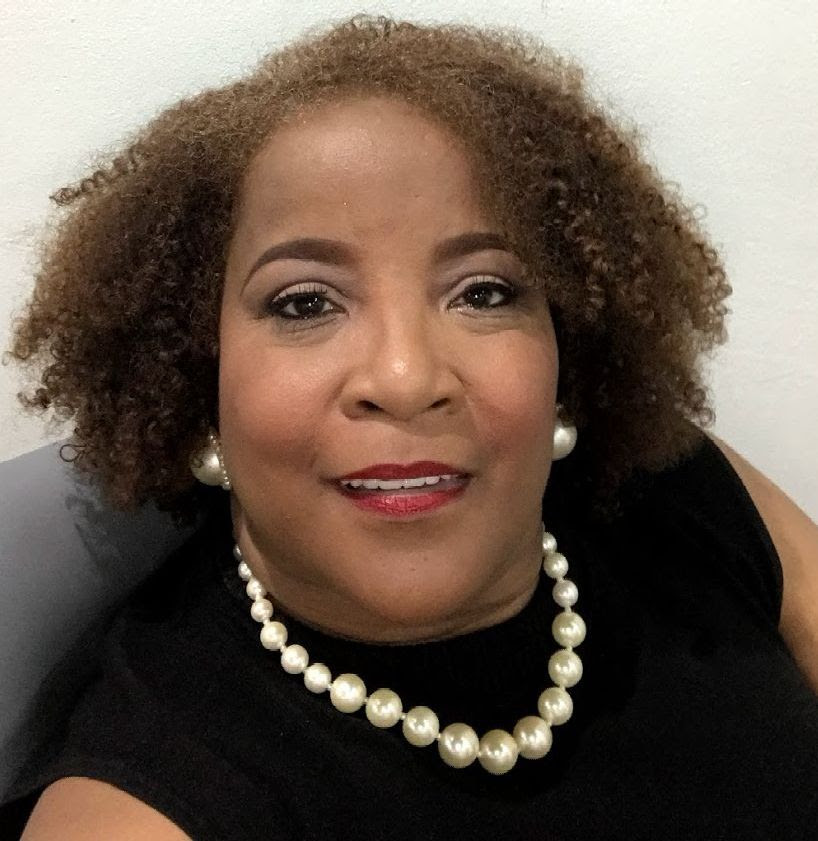 “Texas Metro News publisher and editor Cheryl Smith (pictured) has helped The News expand its coverage into communities, particularly in southern Dallas, said Jamie Hancock, The News’ North Texas editor, who led the newsroom partnership and spearheads the newsroom side of the relationship. . . .”
“Texas Metro News publisher and editor Cheryl Smith (pictured) has helped The News expand its coverage into communities, particularly in southern Dallas, said Jamie Hancock, The News’ North Texas editor, who led the newsroom partnership and spearheads the newsroom side of the relationship. . . .”
Dallas’ example “can be replicated well in lots of different communities,” David Chavern, president and CEO of the News Media Alliance, the news industry’s largest trade organization, told the Journal-isms Roundtable in September 2020. “Part of what I want to take on is putting together a how-to manual for publishers to replicate that in various places.”
In one of the latest examples of such cooperation, a new radio program focused on telling the stories of Boston’s Black communities debuted last month as part of a partnership between The Boston Globe and the nonprofit Boston Black News.
NABJ also announced Friday that it planned to induct eight new members into its Hall of Fame and award 14 special honors to Black journalists and communicators.
The Hall of Fame inductees are:
- “A.J. Smitherman, Tulsa Star (posthumously)
- “Claire Smith, Temple University /MLB Writer
- “Cornelius “Neil” Foote Jr., Foote Communications, LLC/ University of North Texas
- “Kirk McKoy, Kirk McKoy Photography, Formerly L.A. Times
- “Monica Roberts, TransGriot (posthumously)
- “Rochelle Riley, City of Detroit/Author
- “Rodney A. Brooks, U.S. News & World Report/Author
- “Roland S. Martin, #RolandMartinUnfiltered/Black Star Network”
- Alexia McKay, Florida Courier: Courier publisher among NABJ honorees
Zachary Kiesch reports on Benton Harbor for ABC’s “World News Tonight” (Credit: YouTube)
Where Was Coverage of This City’s Water Crisis?
Residents of a predominantly Black city in Michigan complain that their water is unfit to drink. Their pleas fail to sufficiently move government officials. Finally, after too much time has elapsed, the state and nation pay attention.
If that sounds familiar, that was the scenario in Flint, Mich., that began in 2014. It’s playing out again in Benton Harbor, a southwest Michigan city of about 10,000.
“The majority of Benton Harbor lost water Wednesday afternoon when the main pipe from the city’s water treatment plant burst,” Louise Wrege and Juliana Knot reported for the Herald Palladium, the local newspaper.
“City officials reported a water system loss of pressure due to the large water pipe break. As a result, the city issued a warning for residents – who still have access – to not drink the water until further notice.”
It was the latest development in a larger story.
“Elevated lead levels were first detected in Benton Harbor in 2018 during routine testing, according to the Department of Environment, Great Lakes and Energy. Much of the city’s water distribution system is about 100 years old,” Craig Mauger reported Tuesday for The Detroit News.
“State and city officials treated Benton Harbor’s drinking water with a corrosion chemical blend that failed to control harmful levels of lead for more than two years and rejected federal requirements to fully study its effectiveness, The Detroit News reported last week.
” ‘Michigan has the strongest lead in drinking water regulation in the nation, so how did another majority Black city get to three years of elevated lead levels in drinking water without anybody really batting an eye?’ Executive Director of the Great Lakes Environmental Law Center Nick Leonard told the News.
“Rev. Edward Pinkney, the Benton Harbor Community Water Council president, told the News that EGLE [Department of Environment, Great Lakes and Energy] should have warned residents three years ago that the water ‘was not drinkable.’ ‘That was the No. 1 thing that they could have come out and said, “Do not drink the water.” But they failed to do so,’ Pinkney said. ‘They are in denial. You never hear them talk about how bad the water is … in three years. That’s criminal.’ ”
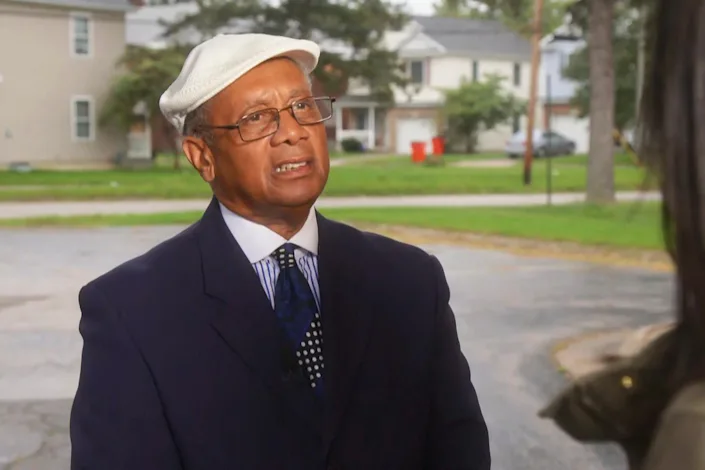
Significant national media attention came only last week, when Michigan Gov. Gretchen Whitmer signed an executive directive Oct. 14 formalizing the urgency of the state’s response to the higher-than-acceptable levels of lead in some of the city’s drinking water.
The state delivered bottled water after issuing an advisory that residents not use tap water for “cooking, drinking, brushing teeth, and mixing powdered infant formula.”
On the “CBS Evening News,” anchor Norah O’Donnell reflected on a piece on the governor’s response Oct. 14 with a reference to a CBS story on the water crisis the day before. “Guess they were watching CBS,” she said with a straight face.
Other networks weighed in as well. But Pinkney told Journal-isms, as he did others, that if the crisis had taken place in a predominantly white town, “the Army would have been called in” and a state of emergency declared.
More than once, PInkney calls the response from the local newspaper, the Herald-Palladium, “horrible” during a telephone conversation. “Local corporations control this community,” which is dominated by Whirlpool. “They decide whether you get news coverage or not. Even News 57,” the South Bend, Ind., station that includes Benton Harbor in its coverage area, produced “absolutely nothing” on the crisis, Pinkney told Journal-isms.
Herald-Palladium Managing Editor Dave Brown disagrees. “Our newspaper has covered this issue extensively,” he messaged Journal-isms Wednesday, listing “just some of the headlines of front page stories in our paper about this issue going back to 2018. We have and will continue to cover this issue closely to keep residents informed about this crisis.”
A search of the WBND – ABC57 website produces a similar list of stories, but as the saying goes, for many, perception is reality.
Detroit is on the other side of the state, but Pinkney credits the newspapers there for their coverage. He also says radio did its share, as did the Michigan Chronicle, part of the Black press. Managing Editor A.J. Williams did not respond to a request for comment.
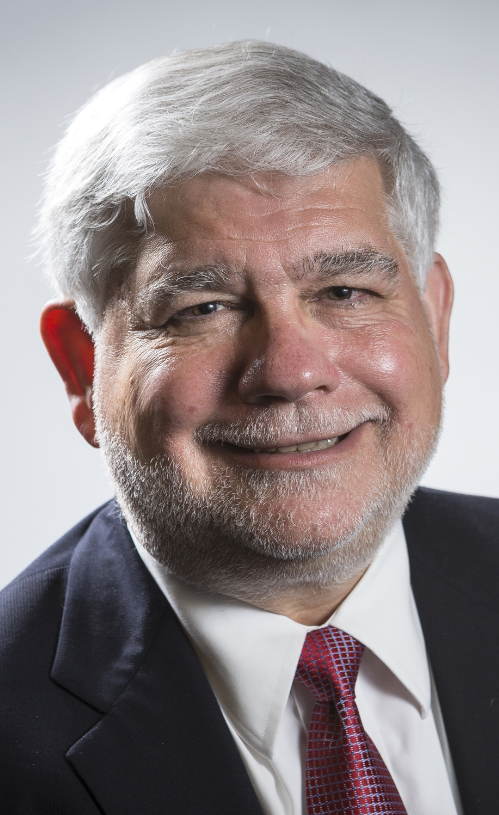 “Benton Harbor has our attention,” Peter Bhatia (pictured), editor and vice president at the Detroit Free Press, messaged Journal-isms on Wednesday. “We have a major takeout on the situation there coming soon.
“Benton Harbor has our attention,” Peter Bhatia (pictured), editor and vice president at the Detroit Free Press, messaged Journal-isms on Wednesday. “We have a major takeout on the situation there coming soon.
“Here’s an example of what we have written to date,” supplying URLs to its stories.
“I believe there is a possibility that this could develop in the way Flint did in terms of neglect from the state. Flint was under a Republican administration; today we have a Democrat administration. So comparison may be difficult, but both cities have the commonality of being majority Black cities. Flint is much larger, known as an auto town. Benton Harbor is next to St. Joseph, MI, a tourism-driven city on Lake Michigan.”
In 2017, Derrick Z. Jackson wrote an analysis of media coverage of the Flint situation that might provide examples of what to avoid. “Sustained and widespread media attention was not given until late 2015 and early 2016, when the state of Michigan and President Obama declared an emergency over high levels of lead in the water and in the blood of thousands of children,” Jackson wrote for the Shorenstein Center at the Harvard Kennedy School.
“Additionally, the nature of some of the coverage was problematic: Complaints of citizens were discounted when compared to the comments of officials, residents were portrayed as hopeless and downtrodden despite months of action, and narratives of ‘heroes’ excluded African American activists in a city that is 57 percent black. . . .”
John Yang reports on Benton Harbor last week for the “PBS NewsHour.”
. . . Editor Says It’s Location, Location, Location
Gary Miles (pictured, below) editor and publisher of The Detroit News, offers a more detailed analysis of the lack of national coverage. Much of it is location, location, location.
“This would make a great academic paper or book for somebody, I imagine,” Miles messaged.
 “I can’t say for certain, of course, about the reasons for the perceived lack of national interest and coverage, but I can offer some suggestions that center largely around politics and media proximity.
“I can’t say for certain, of course, about the reasons for the perceived lack of national interest and coverage, but I can offer some suggestions that center largely around politics and media proximity.
“First, the political differences: Flint had been under emergency financial control of the state, with state-appointed emergency managers running the city for financial reasons, when the water was switched from an established and proven water system based in Detroit to Flint River water.
“And the state was led by a Republican governor. It wasn’t in the governor’s best interest to endorse the switch from Detroit water to Flint River water, because Detroit was similarly under state control and in or headed for bankruptcy, and needed that water revenue. But it was under his watch, the state was first in denial and then slow to react and it took too long to take appropriate corrective action.
“The Republican administration’s denial and slow reaction led to understandable heat, and Democrats helped publicize that, even on a national stage (2016 Democratic presidential debate held in Flint). In addition, it’s a much bigger city (90ishK to 10K), it’s more proximate to Detroit, so both The News and Free Press also gave it considerable coverage. Flint is just 40 miles from the seat of Oakland County, Pontiac.
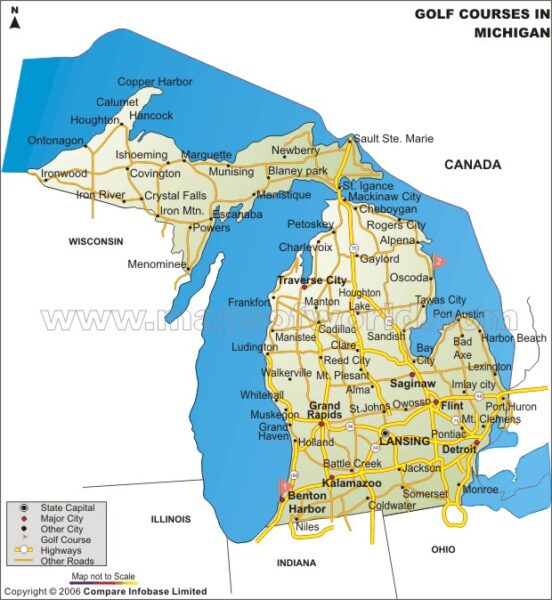
“Benton Harbor is considerably farther away from Metro Detroit – 190 miles – and is closer to Chicago (but two states away from Illinois, so probably not on the radar there). In addition, the political situation is significantly different. The city was (but is no longer) under state control. We have [had] a Democratic governor since 2019. The first high lead reports came during the final quarter (fall 2018) of the Republican [Rick] Snyder administration, but the past three years were under a Democratic administration, and perhaps because it spanned administrations of both political parties, Republicans have not seized on the crisis in the same way as Democrats did.
“So there’s perhaps a different level of state culpability, which makes for a different news story. As the story played out among some outlets, it’s the difference between ‘GOP governor poisons majority Black city’ vs. ‘Local city can’t fix water problems, not getting enough state, federal help.’ Also, Flint had a non-political ‘hero’ of sorts – a doctor who forced the state’s hand by showing that lead levels among children were increasing in the city, which propelled state action, outrage and scrutiny.
“Significantly, the media situation is also far different. Flint is historically one of Michigan’s largest cities, the home of the labor movement, an industrial city home to auto suppliers and factories that are a part of the routine coverage of Detroit newspapers and it’s close by. Plus, the Flint newspaper outlet is owned by MLive.com, part of Advance, a company with a big national footprint. The Detroit News is owned by MediaNews Group, the second largest newspaper company in the nation and the Free Press is owned by Gannett, the largest. While Flint is in its own TV DMA, it’s close enough for the Detroit stations to at least consider for coverage, given the political ramifications. The ACLU based in Detroit was heavily involved. We all covered Flint.
“Benton Harbor is in the South Bend/Elkhart, Ind., television news market, 60 miles away and in another state from Benton Harbor, and the city is 80 miles from Grand Rapids, which doesn’t necessarily get involved in coverage of outstate issues (there may be exceptions). The Herald-Palladium is owned by none of the big companies, as I recall, but by Paxton Media Group LLC, a company for which I couldn’t immediately find a website, but which probably can’t propel the story nationally much using its own outlets.
“For what it’s worth, the dynamics even within the Benton Harbor area are interesting. They call themselves the Twin Cities. Benton Harbor (85% black, 45% living in poverty) and St. Joseph (84% White, 7% in poverty) are similar in size but opposite images – a largely impoverished majority Black city and a relatively affluent majority White city. The Herald Palladium covers both towns and the region beyond.
“As we have seen the media footprint shrink in Michigan, especially the staffs of newspapers in our smaller cities, The Detroit News has increasingly kept a keen eye on outstate issues where we think our resources can bring attention, scrutiny and help. Benton Harbor’s dangerous water is one of those.
“This is a difficult balance, because we have a major city to cover with significant problems of its own. And we cover a metropolitan area of 4 million people, many of whom will never step foot in Benton Harbor. Still, it’s gratifying to hear that our coverage is noticed and, we hope, drawing attention to a critical issue. It wasn’t lost on us that the state announced its major initiative to address the water last week on the same day we published a major story on criticism of the state’s response thus far. Issues like those in Benton Harbor deserve as much journalism [as] they can get.”
- Dave Boucher, Detroit Free Press: Senate committee investigating Michigan’s response to Benton Harbor water crisis
- Leonard N. Fleming, Detroit News: Recall petition filed against Benton Harbor mayor over lead crisis
- Amy Goodman with Edward Pinkney and Mona Hanna-Attisha, “Democracy Now!”: “Racism Plays a Major Part”: Like in Flint, Lead Pipes Leave Benton Harbor, Michigan, with Toxic Water
- Scott McClallen, The Center Square, Iosco County (Mich.) News Herald: Michigan didn’t protect Benton Harbor residents from lead, critics say
- Natural Resources Defense Council: Petition for Emergency Action under the Safe Drinking Water Act (PDF)
- Natural Resources Defense Council: Groups Fighting for Safe Drinking Water in Benton Harbor React to Governor Whitmer’s Executive Directive for “Whole-of-Government” Response
- Frances Kai-Hwa Wang, “PBS NewsHour”: How ‘segregation, disinvestment, and concentrated poverty’ preceded lead troubles in Benton Harbor

2 Women File Suit Against Black News Channel
Two terminated employees of Black News Channel have filed suit in Cook County (Ill.) Circuit Court claiming gender discrimination, Scott Jones reported Wednesday for FTV Live.
“Women at Black News Channel are routinely paid less than men in equivalent positions, and forced to conform to sexist or misogynistic stereotypes about how women are supposed to behave,” Ashley Flete and Claudia Jean (pictured below) said in their class action suit. “This action seeks to vindicate the rights of women employees at Black News Channel.”
 Flete said that about six months into her tenure, while hosting the channel’s morning show, “a producer began berating Ashley in her earpiece. That berating included statements that Ashley was insufficiently feminine.” She said her contract was terminated after she complained to the network’s human resources department, and was informed “they no longer needed a morning show host. . . . in fact, BNC hired a new morning show host to replace Ashley less than six weeks later.”
Flete said that about six months into her tenure, while hosting the channel’s morning show, “a producer began berating Ashley in her earpiece. That berating included statements that Ashley was insufficiently feminine.” She said her contract was terminated after she complained to the network’s human resources department, and was informed “they no longer needed a morning show host. . . . in fact, BNC hired a new morning show host to replace Ashley less than six weeks later.”
The suit says that Jean worked as a talent producer in 2020 and 2021.
“However, throughout her tenure at BNC, staff members also laughed at Claudia at meetings for mannerisms they deemed insufficiently feminine or too aggressive.”
“On the morning of Thursday, February 24, 2021, at 10:31 a.m. ET, supervisor Sarah Edwards telephoned Claudia. Edwards informed Claudia that she had an ‘attitude’ and was ‘aggressive’ and ‘pushy,’ which Edwards believed was not how women should behave . . . .”
Her employment, too, was eventually terminated.
A Black News Channel spokesperson said the network was preparing a response.
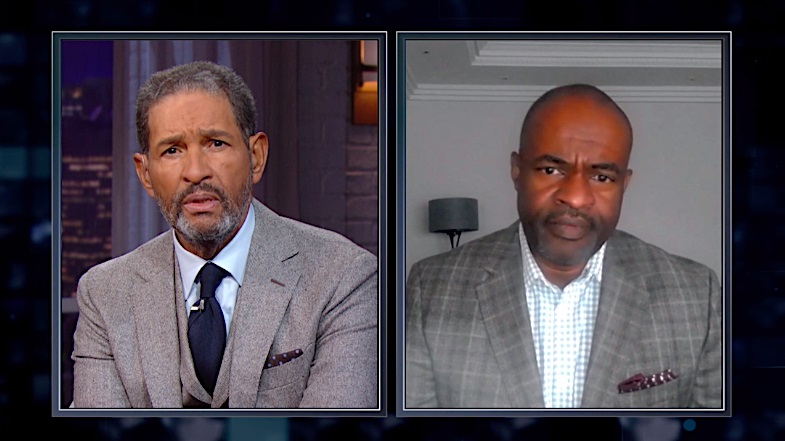
DeMaurice Smith Blasts Blacks Defending Gruden
DeMaurice Smith, the executive director of the NFL Players Association who was the object of a racist trope by deposed NFL coach Jon Gruden, has called it “abhorrent” that Black commentators would defend Gruden, “knowing that they live in this legacy of America’s past.”
Smith thus joined other commentators criticizing Mike Tirico and Tony Dungy, who defended Gruden on the Oct. 10 broadcast of NBC’s “Football Night in America.”
“Dumboriss Smith has lips the size of michellin (sic) tires,” Gruden had written in a 2011 email reviewed by The Wall Street Journal.
“Mike Tirico pointed out that he was working alongside Jon Gruden during the time the coach wrote the racist email referencing the size of DeMaurice Smith’s lips,” Barrett Sports Media reported.
“The two were partners on Monday Night Football for seven years. Tirico speculated that that likely means he knows Jon Gruden personally as well or better than anyone in the NFL.
“ ‘He said it right. He was ashamed by the comments in the email. The comments in the email are wrong,’ Tirico said. ‘But, my experience kinda [parallels] Tim Brown, who played for Jon, a hall of fame wide receiver. He said he never experienced or saw anything that would say Jon was racist in any way. That was exactly the experience I had those seven years of traveling, three days on the road every week. ‘ ”
Dan Wolken added Oct. 12, updated Oct. 13, for USA Today, “Those words certainly look naïve, at best, after more e-mails full of homophobic and misogynist language emerged in a New York Times report on Monday night, prompting Gruden to step down. And the reason Tirico and Dungy look so foolish today is because they allowed their assessment of Gruden to overshadow a fundamental truth about bigots: Most of them are pretty good at hiding their bigotry.”
On @SNFonNBC I commented on an e mail sent by Jon Gruden. I did not defend it. I said “inappropriate, immature, attack on a man’s character. Wrong!” I did not attribute it all to racism and said given a single incident 10 yrs ago we should accept his apology and move on.
— Tony Dungy (@TonyDungy) October 12, 2021
Bryant Gumbel raised the issue with Smith Teusday on HBO’s “Real Sports With Bryant Gumbel.”
From the transcript:
“BRYANT GUMBEL: You’ve spoken with Jon Gruden over the years. When you first saw it, shock you, surprise you?
“DEMAURICE SMITH: First of all I would say it was more shocking that a group of people, apparently in an email conversation, felt that it was comfortable enough to engage in a conversation like that that certainly denigrated me and — and people who look like me, but also revelations about what those conversations included. Shocked to see it, but I’m not naïve enough to believe that there aren’t people out there who are doing this.
“It hurt me that my family had to see this. There’s always this need to somehow reduce you to something less than you are. Everybody who smiles in your face on the front end isn’t saying something behind your back on the other.
“BRYANT GUMBEL: I’m not eager to minimize what Gruden did, but the bigger issue is the idea that he felt comfortable saying what he did in the forum in which he said it.
“DEMAURICE SMITH: That’s it. That’s it. And to me, the next iteration of that conversation is he felt comfortable enough to say it with the people that he was on the email chain with. But the next step of that is of course the people who defended him or gave him a pass on Sunday who look more like us than like him.
“BRYANT GUMBEL: Right. You’re speaking specifically of broadcasters of color who basically apologized for Jon Gruden and gave him a pass.
“DEMAURICE SMITH: It’s abhorrent to think that a group of people are on that email chain being comfortable saying that. It’s equally abhorrent to me to see a group of people defend it, knowing that they live in this legacy of America’s past. They live in this hope of America’s future. We can’t be truly hopeful when those people continue to excuse or apologize for something.
“DEMAURICE SMITH: There are certain people that have – – have and have had a plantation mentality in this league. I think it would be unfair to sweep everybody up in this. But — I guess my — my point is for the people in this league, and I’m talking primarily of ownership, who believe that this league should be something better — they’re going to have an opportunity to match actions to their words.
“And if they refuse to do that, my message to some of them that I’ve made and — and now the message to them publicly is, ‘Your refusal to step up to the plate and demand — an investigation or demand the release of — of any evidence of– impropriety will speak volumes about whether you indeed — believe in this — in this racist mentality or this plantation mentality or– or even worse, whether you believe that the National Football League can be a better part of itself.’ ”
- Wayne Bennett, the Field Negro: A culture of “casual bigotry” comes back to bite “Chucky”.
- LZ Granderson, Los Angeles Times: Jon Gruden: Just the NFL’s latest ‘distraction’ from its racism and misogyny
- Suzette Hackney, USA Today: Every workplace has a Jon Gruden. There should be a higher standard in corporate America.
- Roy S. Johnson, al.com: White men can’t email; not anymore
- Rob Maaddi, Associated Press: Fallout from Jon Gruden emails leads to diversity questions
Context Needed on Failure to Pass Voting Rights
The failure of the Senate Wednesday to pass new voting rights legislation because Democrats could not reach the 60 votes needed to overcome a filibuster recalls advice about context put forward in February at the Journal-isms Roundtable.
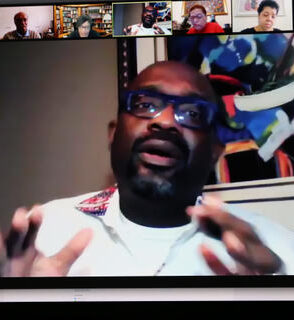 The Rev. William H. Lamar IV (pictured) of Washington’s Metropolitan AME Church, where a Black Lives Matter banner was burned, told the group, “what I’m looking for is context. When we talk about the filibuster, we’ve got to understand, it started with John C. Calhoun and a cold racist who is roasting in hell right now — if there is such a physical place, I’m not so sure, but he used a talking filibuster, beginning in the 1850s, when it looked like slavery was losing its political protection, and then his political progeny, Strom Thurmond, he used the same thing.
The Rev. William H. Lamar IV (pictured) of Washington’s Metropolitan AME Church, where a Black Lives Matter banner was burned, told the group, “what I’m looking for is context. When we talk about the filibuster, we’ve got to understand, it started with John C. Calhoun and a cold racist who is roasting in hell right now — if there is such a physical place, I’m not so sure, but he used a talking filibuster, beginning in the 1850s, when it looked like slavery was losing its political protection, and then his political progeny, Strom Thurmond, he used the same thing.
“It was used time and time again to shore up white supremacy and to stop anything that looks like democracy. That is a story that has to be told. Don’t just talk about the filibuster out of the blue as if it has no historical analog and as if it — it is the same thing. They will use it today (to stop) COVID relief. That is akin, if they could, to shoring up enslavement and keeping Jim Crow strong. It is keeping the resources of the government from the most vulnerable.
“It is keeping the status quo in place. So what I am looking for from journalists — I know it’s difficult ’cause you don’t have a lot of words and the American public is — I hate to say this, but so dumbed down . . . I know you all are smart enough to figure out that this is not a new thing and the way that Mitch McConnell is using it today is the way that John Calhoun used it. For the similar purpose of keeping anything that looks like democracy from flourishing.
“Those are the kind of stories, so that maybe it might serve to wake us up.”
- Charles M. Blow, New York Times: Texas, Harbinger of Doom (Oct. 13)
- Charles M. Blow, New York Times: Last Chance to Save American Democracy
- Jamelle Bouie, New York Times: Joe Manchin Doesn’t Like What Joe Biden Is Doing
- Stephen Collinson, CNN: Bannon case and stalled voting rights bill show how GOP has given up on democracy
- Mary C. Curtis, Roll Call: Will those who yell the loudest teach kids how the world really works?
- Josh Feldman, Mediaite: Biden Open to Eliminating Filibuster on Voting Rights ‘And Maybe More’
- Kayla Goggin, Courthouse News Service: 11th Circuit rejects Black women’s challenge to Florida felon voting law
- Renée Graham, Boston Globe: Mitch McConnell is polishing his masterwork — destroying voting rights
- Carlisa N Johnson, the Guardian: Voting rights veterans share lessons with new generation of activists: ‘Build on the foundation’

Drive Aims to Provide Ethel Payne a Proper Grave
“Ethel Payne was fearless. Throughout her illustrious career, the ‘First Lady of the Black Press’ was known for asking tough questions, drawing ire from those in power,” Jamie Nesbitt Golden reported Monday for Block Club Chicago.
“Payne took on presidents and press secretaries, traveling the world to chronicle meetings between heads of state and conflicts in the Global South. She taught journalism at Fisk University and lent her pen to efforts to free Nelson Mandela in the late ’80s.
“But Payne’s grave in Mount Glenwood Cemetery in south suburban Glenwood is unmarked. It isn’t completely clear why. Thirty years later, a local travel historian has launched a crowdsourcing campaign to buy a headstone for the trailblazer.
“Tammy Gibson has spent the past decade documenting historical African American sites and cemeteries of the enslaved. She came across Payne’s story while doing research on the Chicago Defender, where she’s a contributing writer.
“ ‘I’m learning about her history, her legacy and how much she meant to Chicago. … Then I found out that she was buried in an unmarked grave. When the cemetery confirmed it, it broke my heart,’ said Gibson, who is raising the money with help from the National Association of Black Journalists.
“Gibson requested permission from the cemetery to raise money for a proper headstone. Once Staffers there told her Payne had no surviving relatives, they gave Gibson the go-ahead to launch a GoFundMe. A little over $4,400 has been raised so far, putting the campaign at the halfway mark of its $8,852 goal. . . .”
- Tammy Gibson, Chicago Defender: Forgotten Heroine, Ethel Payne: Pioneer of the Black Press (Oct. 8)
Short Takes
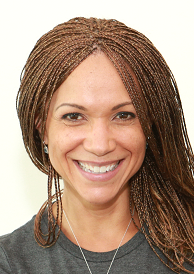 WNYC Studios and PRX today announced that Melissa Harris-Perry (pictured) has been named host and managing editor of “The Takeaway,” a nationally syndicated public radio news program that airs on more than 300 stations, WNYC Studios and PRX announced Monday. “Harris-Perry has been serving as interim host since July 2021.
WNYC Studios and PRX today announced that Melissa Harris-Perry (pictured) has been named host and managing editor of “The Takeaway,” a nationally syndicated public radio news program that airs on more than 300 stations, WNYC Studios and PRX announced Monday. “Harris-Perry has been serving as interim host since July 2021.
- “A California man has pleaded guilty to threatening a journalist’s family over statements the journalist made following the 2020 presidential election,” Marisa Sarnoff reported Friday for Law & Crime. “Robert Lemke, 36, pleaded guilty Friday to making threatening interstate communications to a New York-based family member of a journalist. . . . Prosecutors did not name any of the journalists, politicians, or family members who Lemke threatened. The New York Daily News reported, however, that Lemke appears to have targeted CNN media correspondent Brian Stelter, a cousin of ABC anchor George Stephanopoulos, and a CNN Business writer. As Law&Crime previously reported, Rep. Hakeem Jeffries (D-N.Y.) confirmed that he was the congressman that Lemke had targeted. . . .”
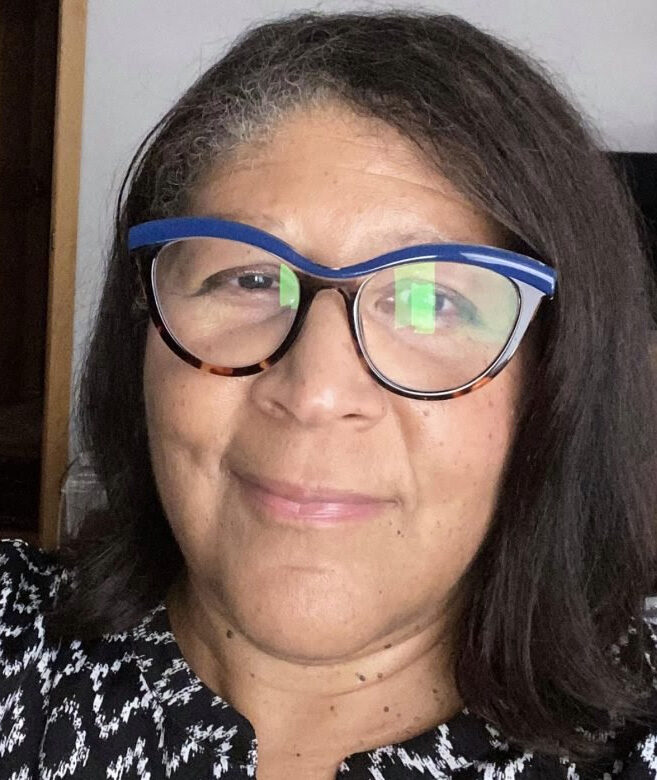 “Lorraine Forte (pictured), former executive editor of The Chicago Reporter and former editor-in-chief of Catalyst Chicago, was named editorial page editor of the Sun-Times Monday,” Robert Feder reported Monday in his Chicago media column. “It marks a return to the Sun-Times for Forte, who stepped down as a member of the editorial board in August to work for the Chicago Police Department in communications. Earlier in her career she also worked as a reporter for the Sun-Times. Forte succeeds Tom McNamee, who retired Friday as editorial page editor after four decades at the newspaper. Forte’s appointment is effective October 28. . . .”
“Lorraine Forte (pictured), former executive editor of The Chicago Reporter and former editor-in-chief of Catalyst Chicago, was named editorial page editor of the Sun-Times Monday,” Robert Feder reported Monday in his Chicago media column. “It marks a return to the Sun-Times for Forte, who stepped down as a member of the editorial board in August to work for the Chicago Police Department in communications. Earlier in her career she also worked as a reporter for the Sun-Times. Forte succeeds Tom McNamee, who retired Friday as editorial page editor after four decades at the newspaper. Forte’s appointment is effective October 28. . . .”
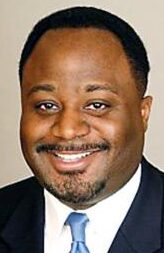 Political commentator Abdul-Hakim Shabazz (pictured), editor and publisher of Indy Politics and an attorney, says he was turned away from a press conference held by Indiana Attorney General Todd Rokita last week despite holding media credentials, Haley Pritchett reported Sunday for TheStatehouseFile.com, the Tribune-Star in Terre Haute, Ind., reported Sunday. The StatehouseFile.com is a news website produced by Franklin College journalism students. Brandon Pope, a broadcast journalist and Ball State University alumnus who is president of the Chicago chapter of the National Association of Black Journalists, said that without Black journalists in the room, there cannot be full coverage.
Political commentator Abdul-Hakim Shabazz (pictured), editor and publisher of Indy Politics and an attorney, says he was turned away from a press conference held by Indiana Attorney General Todd Rokita last week despite holding media credentials, Haley Pritchett reported Sunday for TheStatehouseFile.com, the Tribune-Star in Terre Haute, Ind., reported Sunday. The StatehouseFile.com is a news website produced by Franklin College journalism students. Brandon Pope, a broadcast journalist and Ball State University alumnus who is president of the Chicago chapter of the National Association of Black Journalists, said that without Black journalists in the room, there cannot be full coverage.
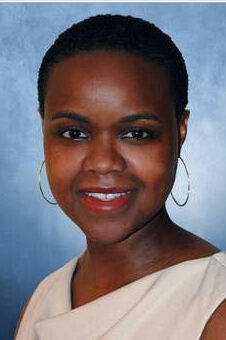 In Jacksonville, Fla., Terri Cope-Walton has been named vice president and general manager of WJXT-TV and WCWJ, the CW affiliate, Graham Media Group, Inc., a Graham Holdings Company subsidiary, announced Oct. 13. “Cope-Walton replaces Bob Ellis, who was named vice president and general manager of Graham Media Group station WDIV in Detroit, Michigan earlier this year. ‘Terri is fiercely committed to localism and deeply strategic in her approach to leading multi-platform community-focused media.’ . . .”
In Jacksonville, Fla., Terri Cope-Walton has been named vice president and general manager of WJXT-TV and WCWJ, the CW affiliate, Graham Media Group, Inc., a Graham Holdings Company subsidiary, announced Oct. 13. “Cope-Walton replaces Bob Ellis, who was named vice president and general manager of Graham Media Group station WDIV in Detroit, Michigan earlier this year. ‘Terri is fiercely committed to localism and deeply strategic in her approach to leading multi-platform community-focused media.’ . . .”
- In a realignment of top newsroom managers at The Washington Post, “Krissah Thompson, named The Post’s first managing editor for diversity and inclusion last year, will add responsibility for climate and environmental coverage, features reporting and recruitment,” Paul Farhi reported Tuesday for the Post.
- Just back online after a one-week suspension from YouTube for violating its hate speech policy in a tirade against the trans community, conservative YouTube host Steven Crowder Wednesday used a segment on In-N-Out Burger shuttering its only Bay Area outlet over vaccination status requirement to mock and belittle KPIX 5’s Betty Yu, Dominic Patten reported for Deadline. “CBS Television Stations and KPIX 5 fully support our colleague Betty Yu and condemn the horrific, racist comments directed at Betty as well as the other demeaning Asian stereotypes spread during Steven Crowder’s program on Wednesday,” said a joint statement from CBS Television Stations President Jennifer Mitchell and KPIX-TV San Francisco President/GM Kevin Walsh. The Asian American Journalists Association issued a statement Thursday.
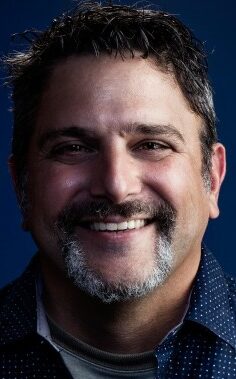 Julio Ricardo Varela (pictured), interim co-executive director at the Futuro Media Group, will additionally become a columnist for MSNBC Daily, a digital commentary and opinion section on the MSNBC website, a spokesperson confirmed Wednesday. “He’ll write columns on immigration and Latino issues and more.”
Julio Ricardo Varela (pictured), interim co-executive director at the Futuro Media Group, will additionally become a columnist for MSNBC Daily, a digital commentary and opinion section on the MSNBC website, a spokesperson confirmed Wednesday. “He’ll write columns on immigration and Latino issues and more.” . . . Also signed on as an MSNBC columnist is Osita Nwanevu (pictured), contributing editor at the New Republic.
. . . Also signed on as an MSNBC columnist is Osita Nwanevu (pictured), contributing editor at the New Republic.
- A survey of San Diego-area newsrooms by the Society for Professional Journalists, San Diego Professional Chapter, found “Less than half of the newsrooms that responded to the survey employ Black journalists, and only two newsrooms employ Native American journalists. The San Diego Union-Tribune is the only regional newsroom that reported employing a Pacific Islander staff member,” Rick Griffin reported Sunday for the Times of San Diego.
- “Nikole Hannah-Jones, the Pulitzer-Prize winning New York Times journalist who conceived The 1619 Project, said Tuesday that she was recently disinvited from speaking at Middlesex School, a private boarding school in Concord [Mass.], during Black History Month,” Amanda Kaufman and John R. Ellement reported Tuesday, updated Wednesday, for the Boston Globe. ” ‘I think it’s pretty clear that we are in a moment where schools are facing intense pressure not to invite speakers that are considered to be focusing too much on race and racism and the Black experience in American history,’ Hannah-Jones told the Globe Tuesday.”
- “Changes are coming to Central Florida’s Spanish-language media landscape as Univision takes over operations of two TV stations – WVEN-TV and WOTF-TV – and named executive Eddy Elguezabal the president and general manager over its Orlando and Tampa operations,” Jennifer A. Marcia Ocasio reported Oct. 13 for the Orlando Sentinel. “Univision will also take over operations of a station in Washington, D.C. . . . The stations are currently operated by Entravision Communications, whose licensing agreement with Univision concludes on Dec. 31, 2021.” More in Radio & Television Business Report.
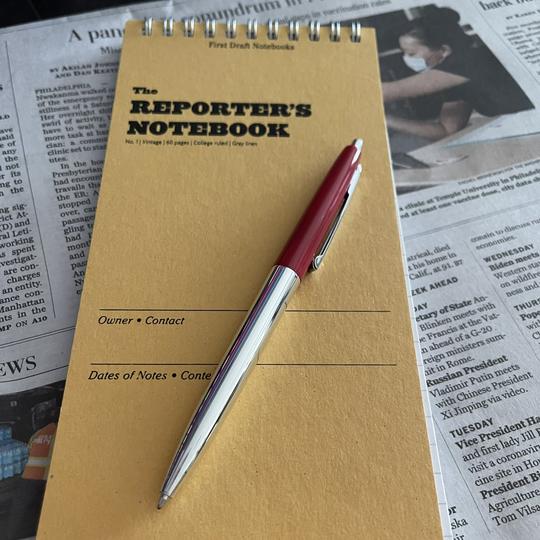 Nic Garcia, politics editor at the Des Moines Register, has created First Draft Notebooks, which he told Journal-isms produces the best reporter’s notebook “any reporter can find at a price they or their newsroom can afford. Most of the generic reporter’s notebooks out there bend horizontally or are too flimsy to write anything down standing up at a news conference.. . . My notebook is the opposite.” The notebooks “do not bend and are sturdy enough to write standing up. The papers is not glued, allowing the user to flip thru pages quickly. And the paper is a heavier weight allowing to use both sides without a bleed. And finally, the most important thing to me is the cost: I was able to make this notebook affordable at just $25 for an order of $10.”
Nic Garcia, politics editor at the Des Moines Register, has created First Draft Notebooks, which he told Journal-isms produces the best reporter’s notebook “any reporter can find at a price they or their newsroom can afford. Most of the generic reporter’s notebooks out there bend horizontally or are too flimsy to write anything down standing up at a news conference.. . . My notebook is the opposite.” The notebooks “do not bend and are sturdy enough to write standing up. The papers is not glued, allowing the user to flip thru pages quickly. And the paper is a heavier weight allowing to use both sides without a bleed. And finally, the most important thing to me is the cost: I was able to make this notebook affordable at just $25 for an order of $10.”
- IllumiNative, which describes itself as a Native-led non-profit “dedicated to battling toxic misconceptions of Native Americans,” is calling on Fox News “to fire hosts Jesse Watters and Rachel Campos-Duffy over a segment in which they tied Native Americans’ struggles to ‘government dependency’ and ‘alcoholism,’ ” Justin Baragona reported Saturday for The Daily Beast. During a joint appearance on “Fox News Primetime,” spouses Campos-Duffy and former congressman Sean Duffy “complained that ‘Christopher Columbus was the first victim of cancel culture’ while arguing that Native Americans “were just as brutal” as Columbus and other European colonizers, Baragona reported. “ ‘They burned villages, raped women, seized children, took the people they defeated, took their land, scalped people,’ Duffy added. . . .”
- In Myanmar, coup “leader Min Aung Hlaing on Monday announced the regime’s decision to free over 1,300 people jailed for participating in anti-coup protests and more than 4,300 detainees who were facing trial on incitement charges for their anti-regime activism,” The Irrawaddy reported Tuesday.
 The Inter-American Court of Human Rights has ruled the Colombian state responsible for the abduction, rape, and torture of journalist Jineth Bedoya Lima (pictured) in 2000. It ordered the Colombian government to investigate, prosecute, and punish those responsible and protect female journalists through investing in public programs to support them, among other measures, the Committee to Protect Journalists said Monday. “The Inter-American Court’s ruling is a historic acknowledgment of the deadly dangers that Colombia’s female journalists face and a recognition of Jineth Bedoya’s brave, tireless quest for justice,” said CPJ Latin America and the Caribbean Program Coordinator Natalie Southwick.
The Inter-American Court of Human Rights has ruled the Colombian state responsible for the abduction, rape, and torture of journalist Jineth Bedoya Lima (pictured) in 2000. It ordered the Colombian government to investigate, prosecute, and punish those responsible and protect female journalists through investing in public programs to support them, among other measures, the Committee to Protect Journalists said Monday. “The Inter-American Court’s ruling is a historic acknowledgment of the deadly dangers that Colombia’s female journalists face and a recognition of Jineth Bedoya’s brave, tireless quest for justice,” said CPJ Latin America and the Caribbean Program Coordinator Natalie Southwick.
- Freelancers: Journal-isms is renewing its search for an assistant editor who would love to help produce this column. Position is part time, 15 to 20 hours weekly. Please see the “About” section of this website for more information.
[btnsx id=”5768″]
To subscribe at no cost, please send an email to journal-isms+subscribe@groups.io and say who you are.
Facebook users: “Like” “Richard Prince’s Journal-isms” on Facebook.
Follow Richard Prince on Twitter @princeeditor
Richard Prince’s Journal-isms originates from Washington. It began in print before most of us knew what the internet was, and it would like to be referred to as a “column.” Any views expressed in the column are those of the person or organization quoted and not those of any other entity. Send tips, comments and concerns to Richard Prince at journal-isms+owner@
View previous columns (after Feb. 13, 2016).
View previous columns (before Feb. 13, 2016)
-
- Diversity’s Greatest Hits, 2018 (Jan. 4, 2019)
- Book Notes: Is Taking a Knee Really All That? (Dec. 20, 2018)
- Book Notes: Challenging ’45’ and Proudly Telling the Story (Dec. 18, 2018)
- Book Notes: Get Down With the Legends! (Dec. 11, 2018)
- Journalist Richard Prince w/Joe Madison (Sirius XM, April 18, 2018) (podcast)
- Richard Prince (journalist) (Wikipedia entry)
- February 2018 Podcast: Richard “Dick” Prince on the need for newsroom diversity (Gabriel Greschler, Student Press Law Center, Feb. 26, 2018)
- Diversity’s Greatest Hits, 2017 — Where Will They Take Us in the Year Ahead?
- Book Notes: Best Sellers, Uncovered Treasures, Overlooked History (Dec. 19, 2017)
- An advocate for diversity in the media is still pressing for representation, (Courtland Milloy, Washington Post, Nov. 28, 2017)
- Morgan Global Journalism Review: Journal-isms Journeys On (Aug. 31, 2017)
- Diversity’s Greatest Hits, 2016
- Book Notes: 16 Writers Dish About ‘Chelle,’ the First Lady
- Book Notes: From Coretta to Barack, and in Search of the Godfather
- Journal-isms’ Richard Prince Wants Your Ideas (FishbowlDC, Feb. 26, 2016)
- “JOURNAL-ISMS” IS LATEST TO BEAR BRUNT OF INDUSTRY’S ECONOMIC WOES (Feb. 19, 2016)
- Richard Prince with Charlayne Hunter-Gault,“PBS NewsHour,” “What stagnant diversity means for America’s newsrooms” (Dec. 15, 2015)
- Book Notes: Journalists Follow Their Passions
- Book Notes: Journalists Who Rocked Their World
- Book Notes: Hands Up! Read This!
- Book Notes: New Cosby Bio Looks Like a Best-Seller
- Journo-diversity advocate turns attention to Ezra Klein project (Erik Wemple, Washington Post, March 5, 2014)
When you shop @AmazonSmile, Amazon will make a donation to Journal-Isms Inc. https://t.co/OFkE3Gu0eK
— Richard Prince (@princeeditor) March 16, 2018
![]()

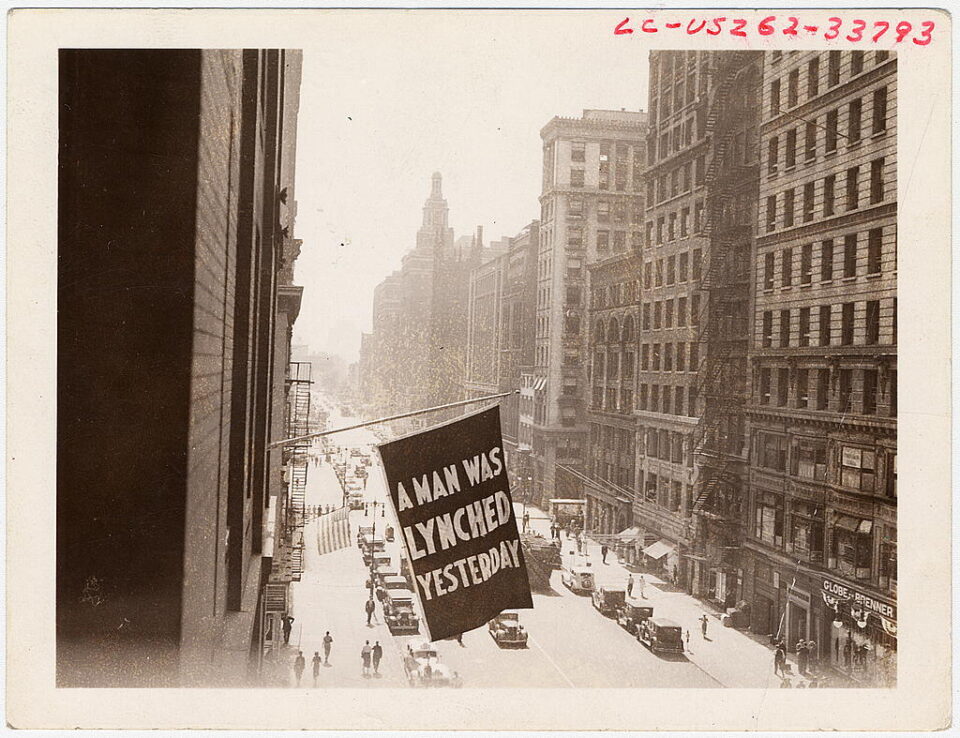
3 comments